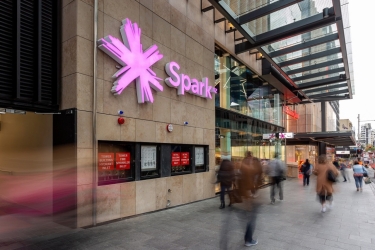According to Spark, economic activity in New Zealand remains subdued, with weak consumer spending and business investment impacting its markets of mobile and IT.
Spark Chair Justine Smyth said: “The Board and Management acknowledge that our current financial performance falls short of what is acceptable, and we understand the disappointment our shareholders will be feeling," Spark Chair Justine Smyth said.
“The challenges we are facing are both cyclical and structural.
"Weak business investment and consumer spending continue to curtail growth and squeeze margins.
"At the same time, we are undertaking a significant transformation of our Enterprise and Government division to address structural segment challenges."
The areas cited as reasons for the reduction in guidance are Spark's main revenue spinners mobile and IT products and services.
Mobile service revenue is now expected to be largely flat year-on-year compared to the original FY25 ambition of about 3% growth, driven by lower anticipated growth in overall mobile connections and pressure on ARPU.
|
|
"During the first quarter of FY25 consumer and SME pay monthly connections continued to grow, but at a slower rate than forecast, while there was a sharper decline in pre-paid connections in a highly competitive market," Spark stated in its announcement to the market.
"Additionally, pay monthly and pre-paid ARPU was impacted by lower spend on extras and casual usage, as customers continue to reduce spending.
"In Enterprise and Government connections remained stable during the quarter, but this was offset by an acceleration in ARPU decline, with increased price erosion at contract resigning and aggressive competitive pricing activity."
Original FY25 guidance assumed stabilisation in the rate of decline of IT services in the second half, and based on the first quarter of trading this remains on track, according to Spark.
However, in IT products the mix shift between private and public cloud has accelerated, negatively impacting margins.
Spark says it is focussed on expanding its SPK-26 cost cutting program to improve its financial performance, and is on track to deliver its net labour cost reduction target of NZ$50 million a year.
“Looking forward, we are resolutely focussed on resetting performance in our core, expanding the SPK-26 Operate Programme to significantly reduce our cost base and offset market headwinds, and simplifying our portfolio,” said Spark Chair Smyth.
“We are reviewing all non-core assets to determine if Spark remains the best owner, or if divestment or partnerships will deliver greater value to shareholders while further strengthening the balance sheet.
"We have made the decision to divest our shareholding in mobile towers business Connexa, and while a transaction is not yet certain, the strong levels of interest we have received is reflective of the high quality of the Connexa business."
Spark CEO Jolie Hodson said the telco has a lot of work ahead of it to win back the confidence of our shareholders.
“While we are navigating a subdued economic environment and increased competitive pricing pressure in the business market, the long-term value drivers of mobile remain," Hodson said.
"Demand for data continues to grow, our brand health is strong, and we are focussed on stimulating growth into the second half through pricing, new campaigns, and a new Endless plan line-up that will deliver our customers higher data allowances than ever before.
"When combined with easing monetary policy, we are confident these tailwinds will continue to support a strong and growing mobile business into the future."







































